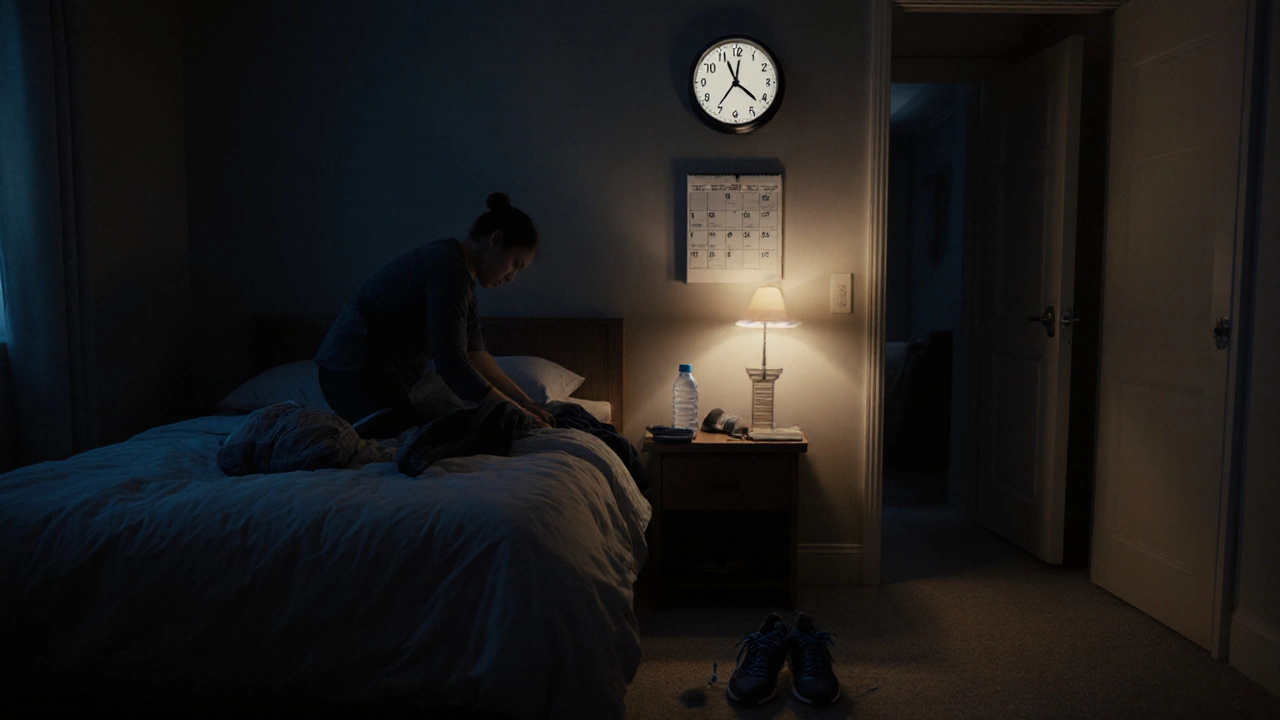Gym Schedule Planner
Your Availability
Select your most reliable workout windows
Your Custom Plan
Progress Tracker
0/0 days completed
Trying to stick to a gym routine but keep skipping days? You’re not alone. Most people start strong, then life, fatigue, or bad planning derailes them. The problem isn’t motivation-it’s structure. Scheduling gym days isn’t about squeezing in extra hours. It’s about designing a plan that fits your real life, not the fantasy version of it.
Start with your weekly calendar, not your goals
Don’t begin by asking, "How many days should I go?" Start by asking, "When am I actually free?" Look at your week. Block out work, family time, meals, and sleep. What’s left? That’s your window. Most people who succeed at consistent gym days don’t have more time-they just use their time better. For example, if you work 9 to 5 and have kids after school, 6:30 a.m. or 7 p.m. might be your only slots. Try both for a week. See which one feels less like a chore. Morning sessions mean you’re done before the day gets messy. Evening sessions help you unwind. Neither is better. Just pick the one you can stick to.Match your schedule to your energy, not your Instagram
You don’t need to train like a pro athlete. You need to train like yourself. If you’re a night person, forcing yourself to wake up at 5 a.m. won’t work. If you crash after lunch, don’t book a 2 p.m. session and expect to lift heavy. Track your energy for three days. Write down how you feel at 8 a.m., 12 p.m., 4 p.m., and 8 p.m. You’ll notice patterns. Most people have one or two high-energy windows. Put your hardest workouts in those slots. Save lighter sessions-like mobility or cardio-for low-energy times.Plan your workouts before you plan your days
A gym day isn’t just "going to the gym." It’s a plan with purpose. If you show up without one, you’ll end up scrolling on your phone or doing the same 20-minute routine every time. Here’s a simple way to structure your week:- Monday: Upper body strength (push/pull)
- Tuesday: Cardio or active recovery (walk, bike, swim)
- Wednesday: Lower body strength
- Thursday: Rest or mobility
- Friday: Full body circuit
- Saturday: Outdoor activity (hike, sport, long walk)
- Sunday: Rest
Use time-blocking, not willpower
Willpower is fragile. It fades when you’re tired, stressed, or hungry. Time-blocking is reliable. Treat your gym time like a doctor’s appointment or a meeting with your boss. Open your calendar app. Block out 60 minutes on Monday, Wednesday, and Friday at 6:30 p.m. Label it "Gym - No Exceptions." Set a reminder 15 minutes before. When that time hits, you go. No debate. No "I’ll do it later." Later never happens. If you’re not a digital person, write it on paper. Stick it on your fridge. Cross it off when done. Seeing progress builds momentum.Accountability beats motivation
Motivation is a spark. Accountability is the fuel. If you’re the only one holding yourself to the plan, it’s easy to break. Find one person who’ll check in. It could be a friend who texts you: "Gym today?" It could be a trainer who tracks your attendance. It could even be a public log-post your schedule on WhatsApp or a notes app. When others know your plan, you’re less likely to skip. In Adelaide, many gyms have community groups or buddy systems. Ask your gym if they run a "3-day streak challenge." Small rewards-like a free protein shake after three sessions-work better than big promises.Prepare the night before
The biggest reason people skip the gym? They didn’t prepare. You’re tired. You’re hungry. You’re thinking, "I’ll just do it tomorrow." Lay out your gear the night before. Pack your gym bag. Put your shoes by the door. Charge your headphones. Fill your water bottle. Make it so easy that skipping feels like more effort than going. If you’re doing morning sessions, set your alarm, put your clothes on a chair, and drink a glass of water before bed. That tiny ritual signals to your brain: "This is happening. No excuses."Expect setbacks. Don’t let them derail you
You will miss a day. Or two. Maybe even a week. Life happens. Sick kid. Work crisis. Travel. Bad weather. That’s normal. The key isn’t perfection. It’s return. Don’t wait for Monday to "start over." Get back on track the next day. One missed session doesn’t ruin progress. Two missed weeks do. If you skip a planned gym day, don’t try to double up the next day. That leads to burnout. Just move the session. If you missed Wednesday, do it Friday. If Friday’s full, do it Saturday. Flexibility keeps you in the game.
Track what matters
Don’t track weight or reps every day. Track attendance. Did you show up? That’s the only number that matters in the first 30 days. Use a simple checklist: a paper calendar, a note app, or a habit tracker. Put an X for each day you go. After seven X’s in a row, you’ve built a habit. After 21, it’s part of your identity. You’re not someone who "tries to work out." You’re someone who goes to the gym.When to adjust your schedule
Your schedule isn’t set in stone. Revisit it every four weeks. Ask yourself:- Which days did I skip? Why?
- Did I feel energized or drained after sessions?
- Is my timing still realistic?
Start small. Stay consistent.
You don’t need five days a week. Start with two. Two consistent days beat five inconsistent ones. Build from there. Once two days feel automatic, add a third. Then a fourth. The goal isn’t to look like a bodybuilder in three months. It’s to become someone who shows up, no matter what. That’s the real win.Your body doesn’t care how hard you pushed on day one. It cares that you came back on day eight. And day fifteen. And day thirty.
How many days a week should I go to the gym?
For most people, 3 to 4 days a week is ideal. This gives you enough stimulus to build strength and endurance while allowing time to recover. Beginners can start with 2 days and add more as they build consistency. More than 5 days isn’t better if you’re exhausted or skipping sessions.
What’s the best time of day to go to the gym?
There’s no universal best time. Morning workouts help you stick to your plan because the day hasn’t derailed yet. Evening workouts help you release stress. Pick the time that fits your energy and schedule-and stick with it. Consistency matters more than timing.
I keep skipping gym days. What should I do?
First, stop blaming yourself. Then, look at your schedule. Are you trying to fit in workouts when you’re already overwhelmed? Simplify. Reduce the number of days. Make preparation easier-pack your bag the night before. Add accountability-a friend, a post, a tracker. Small changes beat big motivation.
Should I plan my workouts in advance?
Yes. Walking into the gym without a plan leads to wasted time and inconsistent results. Even a simple list of 3 exercises per day helps. You don’t need a complex program. Just know what you’re doing before you walk in. It cuts decision fatigue and keeps you focused.
What if I miss a scheduled gym day?
Don’t panic. Don’t try to make up for it with a double session. Just reschedule it for the next available day. Missing one day doesn’t break your progress. Missing two weeks does. The goal is long-term consistency, not perfect attendance.
How long does it take to form a gym habit?
Research shows habits form after 21 to 66 days of consistent action. For most people, sticking to 3 gym days a week for 4 to 6 weeks turns it into a routine. Track your attendance. Celebrate small wins. After a month, you’ll notice you don’t even think about skipping-it just feels normal.
When you schedule your gym days like appointments-not options-you stop fighting yourself. You stop wondering if you "should." You just go. And that’s how real progress happens.






